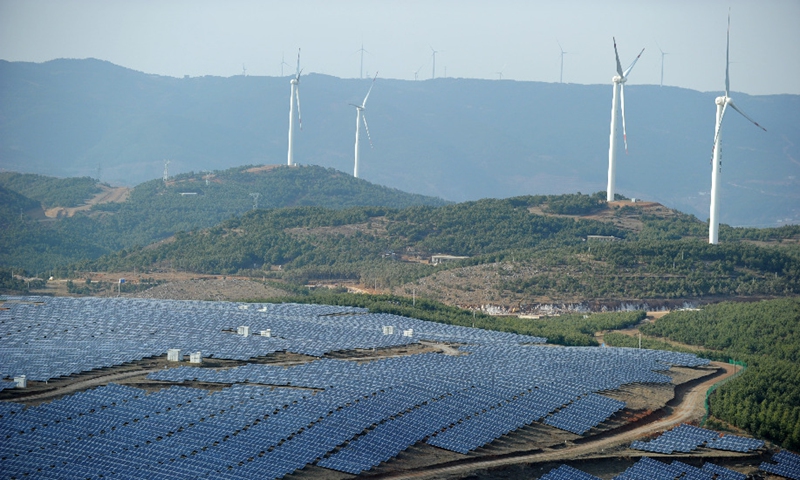

Photo taken on March 13, 2018 shows the Pingjing photovoltaic power station and Dahaizi wind power station in Weining County, southwest China's Guizhou Province.Photo: Xinhua
The Chinese Academy of Sciences (CAS) on Wednesday published an action plan on supporting China's carbon peak and carbon neutrality strategies, focusing on breakthroughs and applications of key scientific technologies on topics including carbon sinking, cleaner and more efficient energy, and green development.
The action plan, published at the headquarters of China's top science institution in Beijing, demonstrates CAS' timeline in science and technology development to support the country's carbon goals, as well as its 18 major tasks, the Global Times learned.
China vowed to reach carbon peak before 2030 and achieve carbon neutrality before 2060.
According to the action plan, by 2025, CAS will have realized breakthroughs in several key technologies to support the carbon peak goal, which includes clarifying the mechanism of carbon sinking to form a scientific plan on carbon source monitoring and calculation.
By 2030, the key technologies to support carbon peak should reach advanced levels in the world. By 2060, a batch of original and disruptive technologies will be applied to strongly support the realization of the carbon neutrality goal.
To reach the aims of the action plan, CAS also presented 18 major tasks.
For instance, it vowed to strengthen the deep integration of energy with basic studies such as mathematics, physics, and chemistry, as well as integration with edge technologies such as the Internet, big data, artificial intelligence, and 5G.
CAS will develop key technologies at a low-cost and high-efficiency energies including wind energy, solar energy, biomass energy, ocean energy, geothermal energy, and other renewable energy sources, as well as make breakthroughs in smart grid and distributed energy to support this form of future power systems with new energy as the main body.
The academy will also make efforts to provide technical support to the safe and sustainable development of nuclear power.
It also listed maintaining talent in carbon emission reduction, enhance multilateral cooperation, promote the construction of key labs, and publicize and spread knowledge about carbon goals as part of its key tasks.
Zhang Tao, Vice President of CAS, said at the press conference on Wednesday that CAS has fully leaned into its advantages of multi-disciplinary institutionalization to organize academicians and experts to form this action plan with nearly half a year of discussions and refinements.
"The action plan is an open science and technology plan that keeps pace with the times and will be adjusted and updated according to the international situation and national strategic needs," Zhang noted.
"The carbon peak and carbon neutrality goal is not only a political promise by China to participate in global environmental management and confronting climate change, but also a broad and deep systematic revolution in the economic society," Yu Guirui, former Deputy Director of the Institute of Geographic Sciences and Natural Resources Research of CAS said on Wednesday. "It is more like a scientific and technological revolution for us," he said. (Global Times)

86-10-68597521 (day)
86-10-68597289 (night)

52 Sanlihe Rd., Xicheng District,
Beijing, China (100864)

